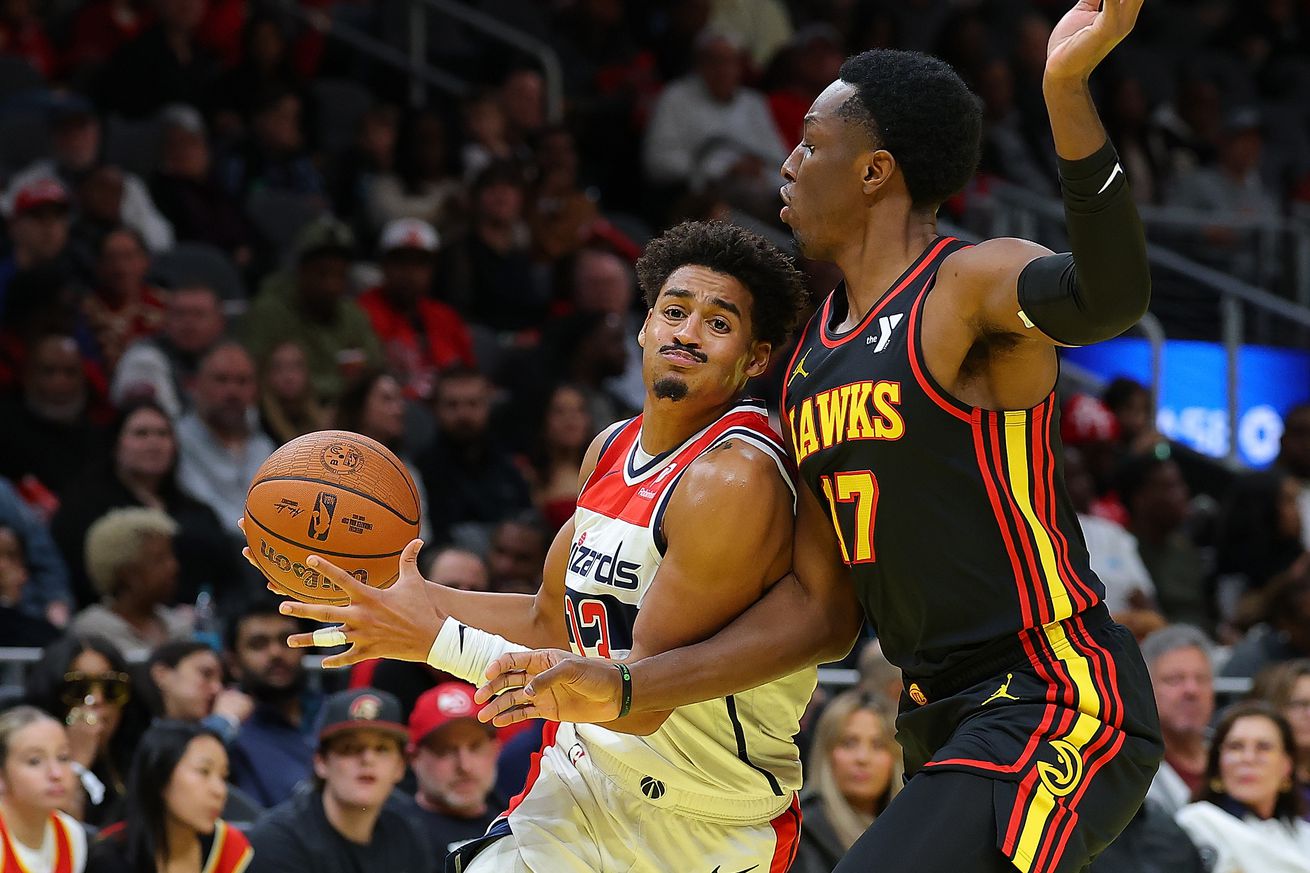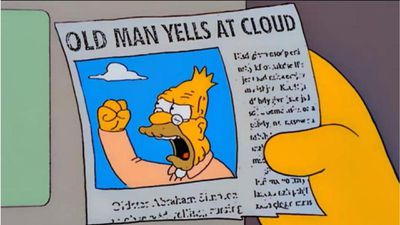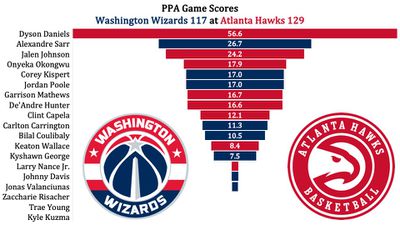
Stats, commentary, analysis.
This one bugs me. It’s not that the Wizards lost. I forecasted them to win just 14 games this season, so I expect them to lose. I’m okay with them losing too — they’re in the hunt for Cooper Flagg or Ace Bailey or a potentially elite talent who can usher in a winning era.
What rankles is the preposterous game from 29-year-old Kyle Kuzma, who started the game 6-9 from the floor and then shot 5-19 the rest of the way…while he also committed four turnovers to zero assists. Meanwhile, 20-year-old Bilal Coulibaly — who might be a key to any success they have in the future had to take seven shots during a garbage time fourth quarter to get his usage rate UP to 15%.
Whatever reason the Wizards have for letting Kuzma compile a usage rate of 36% last night, it was stupid. Whatever reason they have for letting him have a usage rate north of 30% for the season is similarly stupid. Possessions are a precious commodity in the NBA, and if the team is going to set fire to them (which is basically what they’re doing when they grant Kuzma a superstar’s usage rate), they’d be better served distributing them to Coulibaly (15.0% usage last night), Bub Carrington (11.0% usage), or Alex Sarr (20.3%).
Most nights, Kyshawn George would be on the list, but last night his usage was 27.0%. I mean, Corey Kispert had to launch seven fourth quarter shots to get his usage UP to 14.8%.
Kuzma used 25 possessions in 29 minutes of action. The next closest player in total possessions used was Atlanta’s Trae Young, who used 23 possessions in 33 minutes.
How impactful was Kuzma’s chucking? According to my “Plus Points” stat (+PTS), the Wizards’ offense was 10.9 points per 100 possessions below league average. In other words, an average offense would have scored 10.9 points more than the Wizards did last night given the same number of possessions. Kuzma’s +PTS for the game: -10.1.
To be clear, I think Brian Keefe and his coaching staff are doing a good job overall. They’re using a tight rotation (last night, only eight guys played significant minutes) that guarantees the kids playing time. They’ve gotten Jordan Poole making better decisions most nights. But “good” is not perfect, and Kuzma’s combination of high usage and poor efficiency is a multi-season issue that should be addressed. There are better things this team can do with their offensive possessions than let Kuzma waste them.

Moving on, despite being irked by the above, the game itself was odd and somewhat entertaining. The over/under was set at 241.5. Early on, I suggested the under would be the right bet because neither the Wizards or Hawks are much good at offense this season. That mostly bore out — Washington needed a phony fourth quarter comeback to boost their offensive rating (points scored per possession x 100) to 104 (about 9 points per 100 possessions below average), and the Hawks’ offensive rating was 114.
They totaled 246 points because they played at a pace reminiscent of the 1960s — 113 possessions. Average this season coming into last night’s game: 99.2.
Grievances aired, let’s turn to some positives:
- While his game was far from perfect, Alex Sarr had the kind of all-around impact the Wizards hope to get from him for the next 10-15 years. He finished with 20 points on 7-13 shooting, including 3-4 from three-point range. He grabbed four offensive rebounds, and had 4 steals and 3 blocks. Could he finish better inside? Yup. Could he do more work on the defensive glass? Absolutely. Even so, he was still good against Atlanta’s competent bigs.
- Kispert appears to be out of his shooting slump, knocking down 4-8 from deep.
- Jordan Poole committed three turnovers and five fouls, but he was solid overall. That’s a step forward for him — he’s been more feast or famine in his production. Even on a night when he wasn’t at his absolute best, he made good decisions, hit 4-9 from three, and produced five rebounds, five assists, and a couple steals.
- Bub Carrington eliminated the turnovers while setting teammates with nine assists.
- When he finally got involved in the offense, Coulibaly was decent, and he finished the night with nine rebounds, six assists, and two steals. Keefe and Coulibaly need to figure out how to get him involved when the score is 0-0 instead of waiting until they’re down 20.
- One area where Coulibaly contributed (again): defense. Trae Young had another miserable night against the Wizards and Coulibaly. Young finished with 18 points on 5-18 shooting (4-9 from three), 9 assists, and 6 turnovers. That’s an offensive rating (individual points produced per individual possession used x 100) of just 85.
- Kyshawn George had another four assists. The playmaking is an exciting and promising dimension to his game.
Four Factors
Below are the four factors that decide wins and losses in basketball — shooting (efg), rebounding (offensive rebounds), ball handling (turnovers), fouling (free throws made).
Stats & Metrics
Below are a few performance metrics, including the Player Production Average (PPA) Game Score. PPA is my overall production metric, which credits players for things they do that help a team win (scoring, rebounding, playmaking, defending) and dings them for things that hurt (missed shots, turnovers, bad defense, fouls).
Game Score (GmSC) converts individual production into points on the scoreboard. The scale is the same as points and reflects each player’s total contributions for the game. The lowest possible GmSC is zero.
PPA is a per possession metric designed for larger data sets. In small sample sizes, the numbers can get weird. In PPA, 100 is average, higher is better and replacement level is 45. For a single game, replacement level isn’t much use, and I reiterate the caution about small samples sometimes producing weird results.
POSS is the number of possessions each player was on the floor in this game.
ORTG = offensive rating, which is points produced per individual possessions x 100. League average last season was 114.8. Points produced is not the same as points scored. It includes the value of assists and offensive rebounds, as well as sharing credit when receiving an assist.
USG = offensive usage rate. Average is 20%.
ORTG and USG are versions of stats created by former Wizards assistant coach Dean Oliver and modified by me. ORTG is an efficiency measure that accounts for the value of shooting, offensive rebounds, assists and turnovers. USG includes shooting from the floor and free throw line, offensive rebounds, assists and turnovers.
+PTS = “Plus Points” is a measure of the points gained or lost by each player based on their efficiency in this game compared to league average efficiency on the same number of possessions. A player with an offensive rating (points produced per possession x 100) of 100 who uses 20 possessions would produce 20 points. If the league average efficiency is 114, the league — on average — would produced 22.8 points in the same 20 possessions. So, the player in this hypothetical would have a +PTS score of -2.8.
